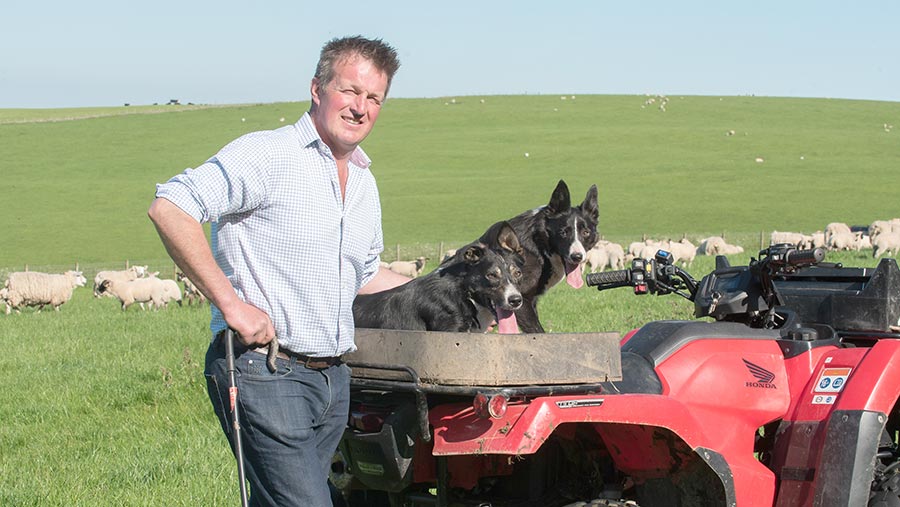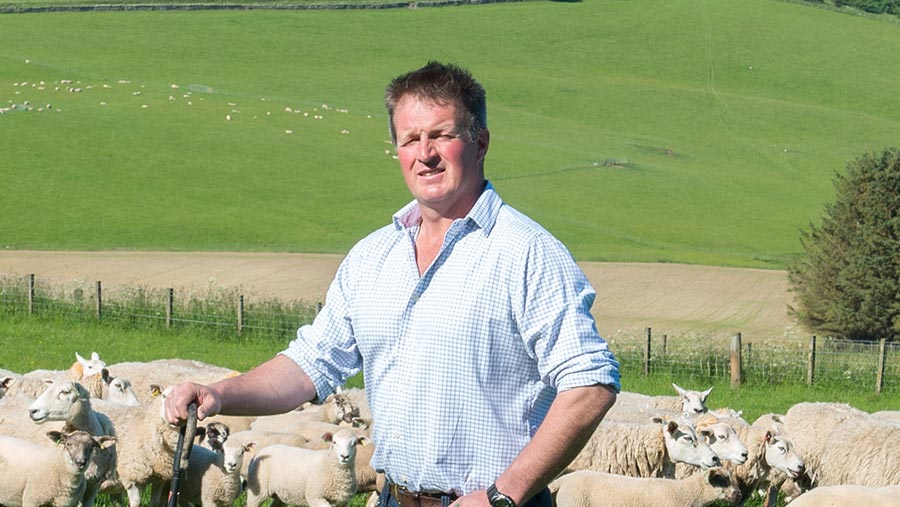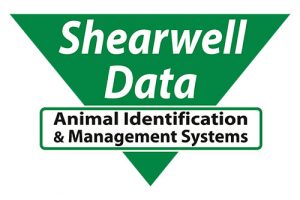Farmers Weekly Awards 2019 : Sheep Farmer of the Year
 James Logan © Angus Findlay
James Logan © Angus Findlay There is a world of science, progressive farming methods and expertise out there, but it takes talent, vision and hard work to put it into practice.
James Logan and the team at Pirntaton have shown they possess these three attributes, having turned a traditional upland pedigree breeding farm into one of the UK’s leading commercial units.
In just six years, James has transitioned from a stratified sheep system reliant on bought-in feed and income from pedigree sales to a forage-based system using New Zealand Romneys.
See also: Meet the 2019 Farmers Weekly Sheep Farmer of the Year finalists

James Logan © Angus Findlay
James Logan
Pirntaton Farm, Galashiels, Scottish Borders
Farm facts
- 632ha, including 100ha of semi-native upland pasture and 92ha of woodland
- 1,900 commercial ewes, 160 stud ewes, 120 suckler cows and 320 hinds
- Land ranges from 230-520m
- 6.4t/ha/year average pasture growth
- Lambs supplied to Woodhead Bros and ScotBeef
- Lambs outside for two cycles from 25 April
The Romneys are crossed to Abertex or Lleyn to produce a maternal, compact, easy-lambing ewe with hybrid vigour. Purebred flocks of Suffolks and maternal Texels are used as terminal sires.
With an open mind and a willingness to learn, James has managed to set change in motion, cut feed costs and simultaneously wean more lambs by growing more grass.
Mindset
Previously, the system produced Blackface rams up to £7,000 and terminal sires that regularly finished in the top averages at the Kelso tup sales.
However, James started to question whether the farm could continue making this work into the future, and looked at lower-cost methods of producing red meat and diversification options.
This is when he embarked on a journey to change his mindset, by travelling, asking questions, seeking advice and becoming a host farm for the Quality Meat Scotland (QMS) grazing group.
Increasing the carrying capacity of the farm and cutting costs is not all he has done to bolster the farm’s profitability. The farm also trialled a collaborative lamb-finishing arrangement with a lowland arable farm on red clover leys in 2018.
The trial finished 500 lambs, taking pressure off the farm during the drought. This approach will be explored further in the future.
Forage budgeting, stocking rate and future planning is undertaken on a pasture-based software system called Farmax.
James is currently planning to run 400 hinds in total and still produce 3,000 lambs a year.
To achieve this, the software has calculated the farm must grow an extra 0.7t DM/ha.
Progress
A pasture subdivision programme began in 2014, splitting up 37 land parcels into more than 120 paddocks, averaging 3.5ha.
A gravity-fed water system supplies paddocks and most watercourses have been fenced off from livestock.
Since 2014, almost 300t of feed has been saved across the sheep and cattle enterprises, with 45t (75%) less lamb feed, 57t (52%) less ewe and hogg feed and 65t (60%) of barley saved each year.
In 2018 – when the farm was affected by the drought – Pirntaton used 64% less feed compared with 2012.
This has been achieved on old swards and only 38kg nitrogen/ha/year. However, more fertiliser and some reseeding work is planned to further increase farm output.
A plantain and red/white clover ley has been grown to finish lambs and 9ha of fodder beet and 12ha of kale will be used to winter sheep this year.
Meanwhile, lamb mortality has fallen from 12-13% to 8.5%, helping to lift weaning rates from about 1.33 to 1.5 lambs weaned a ewe. Liveweight output/ha has increased from 350kg to 506kg.
Winning ways
- A thirst for knowledge and capacity to adapt, learn and tailor new systems to suit the farm
- A clear strategy to lift production through a stocking rate increase of 50 livestock units
- Good division of labour for lambing and grass-measuring duties
- Marketing a range of forage-reared rams
A word from our independent judge
“It was great to see the changes James and his family have made to prepare for the possibility of a subsidy-free world. They are prioritising grass and forage use and livestock performance, while ensuring labour efficiency.”
Liz Genever, independent beef, sheep and forage consultant
The 2019 Sheep Farmer of the Year award is sponsored by Shearwell
 The other finalists were:
The other finalists were:
- Richard Evans
Stonehouse Farm, Thetford, Norfolk - Rhys Edwards
Hendre Ifan Goch, Blackhill, Glamorgan
